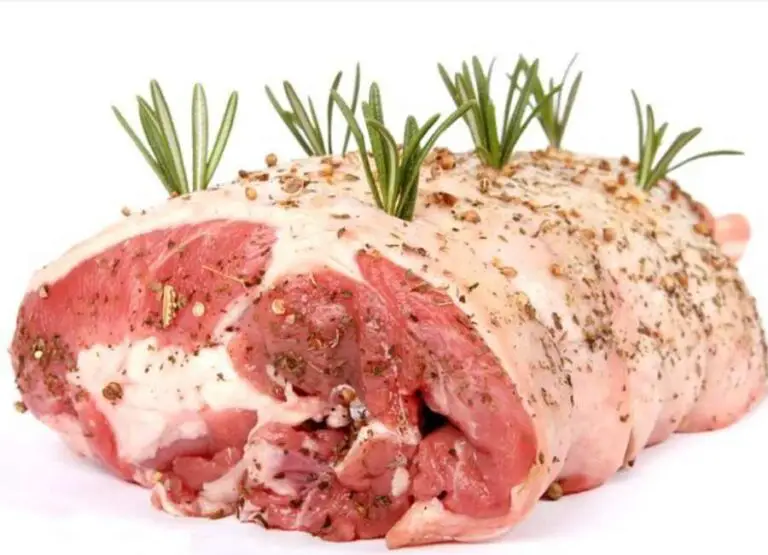How Long Does Seasoned Chicken Last In The Fridge?
Have you ever cooked up some deliciously seasoned chicken and wondered how long it’ll last in the fridge? Well, you’re not alone! It’s important to know how long you can keep that tasty poultry around before it spoils.
In this blog post, we’ll dive into the shelf life of a seasoned chicken in the fridge, so you can worry less about food waste and more about enjoying your mouthwatering meals. Let’s get started!
Understanding Seasoned Chicken
Seasoned chicken refers to chicken that has been marinated or rubbed with a combination of spices, herbs, and other flavorings.
The seasoning adds depth and complexity to the chicken, making it more delicious and enjoyable to eat.
However, the presence of seasoning can affect the shelf life of the chicken, as certain ingredients can accelerate the spoilage process.
How long does seasoned chicken last in the fridge
The shelf life of a seasoned chicken in the fridge can vary depending on several factors, such as the freshness of the chicken before seasoning, the specific ingredients used in the seasoning, and the storage conditions. In general, seasoned chicken can typically be safely stored in the refrigerator for about 2 to 3 days.
It’s important to note that this time frame is a general guideline, and you should always use your best judgment and follow proper food safety practices. If the chicken shows any signs of spoilage, such as a foul odor, unusual texture, or discoloration, it’s best to discard it.
To maximize the shelf life of seasoned chicken, you can consider freezing it. Properly wrapped and stored in the freezer, seasoned chicken can last for several months. Freezing helps to preserve the quality and freshness of the chicken, but it’s important to thaw and cook it properly when you’re ready to use it.
Remember, when handling raw chicken, always practice good food safety habits, such as washing your hands before and after handling, avoiding cross-contamination with other foods, and cooking the chicken to a safe internal temperature of 165 °F (74 °C) to ensure it is thoroughly cooked and safe to eat.
Recommended Storage Time of Seasoned Chicken
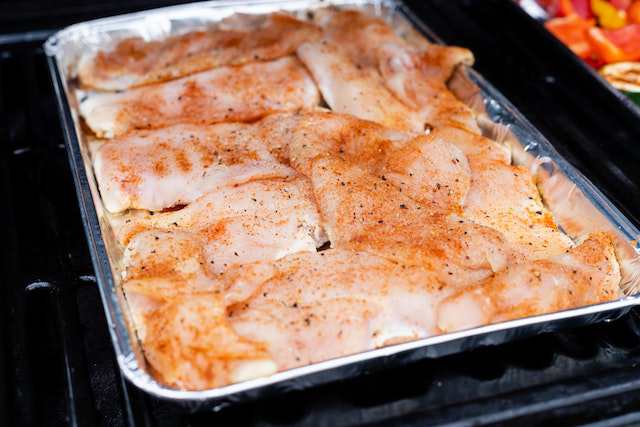
The storage time for seasoned chicken can vary depending on whether it is raw or cooked. Here are some general guidelines to follow:
Raw Seasoned Chicken
Raw seasoned chicken should be consumed or cooked within 1 to 2 days of being seasoned. The seasonings, especially those containing acidic ingredients, can break down the chicken’s texture over time and affect its taste. If you don’t plan to cook the chicken immediately, it is recommended to freeze it for longer-term storage.
Cooked Seasoned Chicken
Cooked seasoned chicken can be refrigerated for 3 to 4 days. Ensure that the chicken has cooled completely before refrigerating it. Store the chicken in airtight containers to maintain its moisture and prevent it from drying out. If you want to store it for longer, consider freezing it for later use.
Factors that affect the shelf life of raw and cooked seasoned chicken
There are several factors that can affect the shelf life of both raw and cooked seasoned chicken. These include:
1. Water content: Water content is a critical factor that affects the shelf life of chickens. Most bacteria require water to grow and multiply. Therefore, the higher the water content in chicken, the higher the likelihood of bacterial growth. To increase the shelf life of a chicken, it is essential to control its water content.
2. Temperature: Temperature is another critical factor that can affect the shelf life of chicken. Bacteria grow most rapidly in the “danger zone” between 40°F and 140°F (4°C and 60°C). Therefore, it is essential to store raw and cooked seasoned chicken at a safe temperature.
3. Oxygen exposure: Exposure of chicken to oxygen can lead to the development of rancidity. Oxygen is known to accelerate the oxidation of unsaturated fatty acids present in chicken leading to unpleasant taste and change in color.
4. pH levels: The pH of chicken affects its ability to support bacterial growth. Chicken with low pH levels (acidic) is resistant to bacterial growth and has a longer shelf life than chicken with high pH (alkaline).
5. Food preservatives: Some food preservatives, such as salt, vinegar, and citric acid, can increase the shelf life of chicken. Preservatives help to suppress the growth of microorganisms and prevent spoilage.
6. Packaging and storage conditions: Proper packaging and storage conditions play a vital role in maintaining the quality and safety of chicken. Vacuum-sealed packages and modified atmosphere packaging (MAP) are popular methods used to extend the shelf life of chicken. Storage temperatures and conditions must be optimized for the chicken to maintain its quality and ensure it remains fit for consumption. Learn more about an inflated raw chicken package
7. Freshness of chicken: The quality and freshness of the chicken itself are critical factors in determining its shelf life. If the chicken used for seasoning is already near its expiration date or has been stored improperly before seasoning, it may spoil more quickly. It is always best to start with fresh, high-quality chicken to maximize the shelf life of seasoned chicken.
8. Type of seasoning: Different seasonings have varying effects on the shelf life of chicken. Salt-based seasonings, such as dry rubs or brines, can act as natural preservatives and extend the chicken’s freshness. On the other hand, seasonings that contain dairy, citrus juices, or raw garlic may shorten their shelf life due to their perishable nature. It’s important to consider the ingredients in the seasoning mixture and their impact on food preservation.
It is essential to note that the shelf life of chicken varies depending on the factors mentioned above. Proper handling, storage, and cooking are necessary to minimize the risk of foodborne illnesses.
Signs of Spoiled Seasoned Chicken
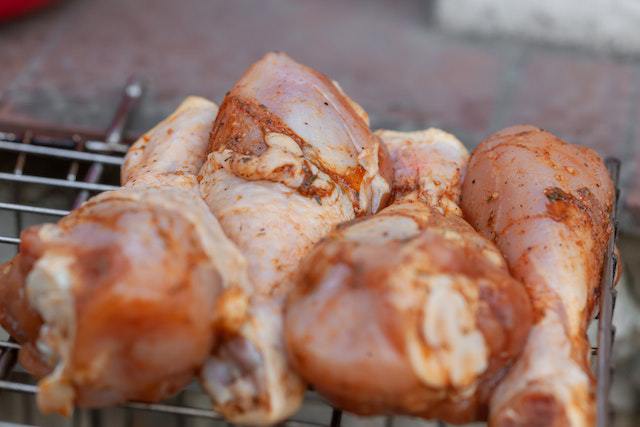
To ensure food safety, it’s important to recognize the signs of spoiled seasoned chicken. If you notice any of the following indicators, it’s best to discard the chicken:
- Foul or unusual odor
- Slimy or sticky texture
- Discoloration, particularly gray or green patches
- Mold growth
- Signs of excessive moisture or dryness
If in doubt, it’s better to be safe and avoid consuming spoiled chicken.
Tips for Proper Storage and Handling of Seasoned Chicken
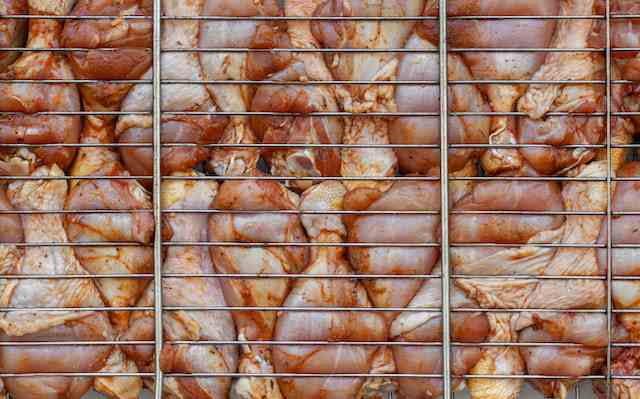
Here are some common tips for proper storage and handling of seasoned chicken:
- Keep chicken refrigerated at a temperature of 40°F or below to prevent bacterial growth. Place the chicken in the coldest part of the refrigerator, away from other foods to prevent cross-contamination.
- Marinate chicken in the refrigerator and transfer it to the grill or oven only when ready to cook. Do not reuse the marinade.
- Cook seasoned chicken to an internal temperature of 165°F to kill any harmful bacteria that may be present.
- Avoid leaving seasoned chicken at room temperature for more than 2 hours. If left at room temperature for too long, bacteria can multiply rapidly, increasing the risk of foodborne illness.
- If you need to transport seasoned chicken, keep it in an insulated cooler with ice packs to maintain a temperature of 40°F or below.
- When handling raw chicken, avoid touching other surfaces or foods in order to prevent cross-contamination. Use separate cutting boards, utensils, and plates for raw chicken and other foods.
- Wash your hands before and after handling chicken, as well as any utensils or surfaces that come into contact with raw chicken.
- Store leftover seasoned chicken in the refrigerator and consume it within 3-4 days. Alternatively, it can be frozen for up to 4 months.
- When reheating leftover seasoned chicken, ensure it reaches an internal temperature of 165°F to kill any bacteria that may remain.
Learn more about getting sick from eating raw chicken.
Related Questions
What happens if I eat seasoned chicken that has gone bad?
Eating seasoned chicken that has gone bad can make you sick and lead to food poisoning. Symptoms include nausea, vomiting, diarrhea, and fever.
Can I tell if a seasoned chicken has gone bad just by looking at it?
Not always. Sometimes, chicken that has gone bad may still look fresh and pink. That’s why it’s important to use your sense of smell as well to check for any unusual or rotten odors.
How can I store seasoned chicken to make it last longer in the fridge?
To ensure that your seasoned chicken lasts longer in the fridge, store it in an airtight container or wrap it tightly in plastic wrap or aluminum foil. This will prevent any bacteria or odors from getting in and keep the chicken fresh.
Can I freeze the seasoned chicken to make it last even longer?
Yes, you can freeze the seasoned chicken to make it last even longer. Just make sure to store it in an airtight container or a freezer bag, and label it with the date. It can last in the freezer for up to 6 months.
How do I know if a seasoned chicken is still good after I’ve thawed it?
To check if seasoned chicken that has been thawed is still good, use your sense of sight, smell, and taste. If it looks and smells normal, and if it tastes good, then it’s likely safe to eat. If in doubt, it’s always better to discard it.
Learn more about cooking raw chicken in the microwave.
Conclusion
In conclusion, it’s always better to be safe than sorry when it comes to storing seasoned chicken in the fridge. As a general rule of thumb, aim to consume it within 3–4 days to avoid any risk of foodborne illness.
And if you’re ever in doubt, always trust your senses – if it looks or smells off, it’s best to throw it out. So go ahead and enjoy your delicious, seasoned chicken – just remember to store it properly and keep an eye on its expiration date!

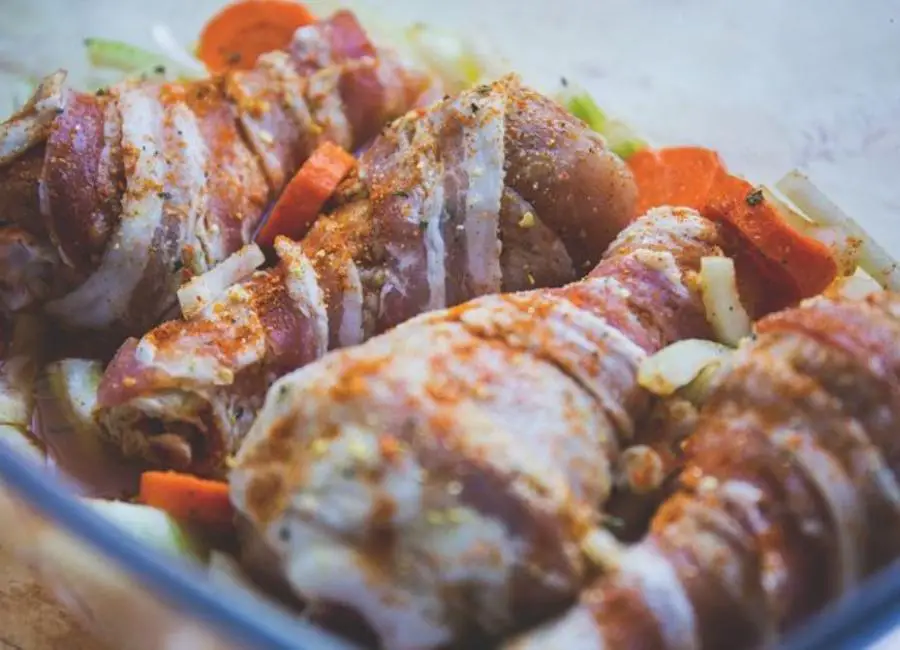
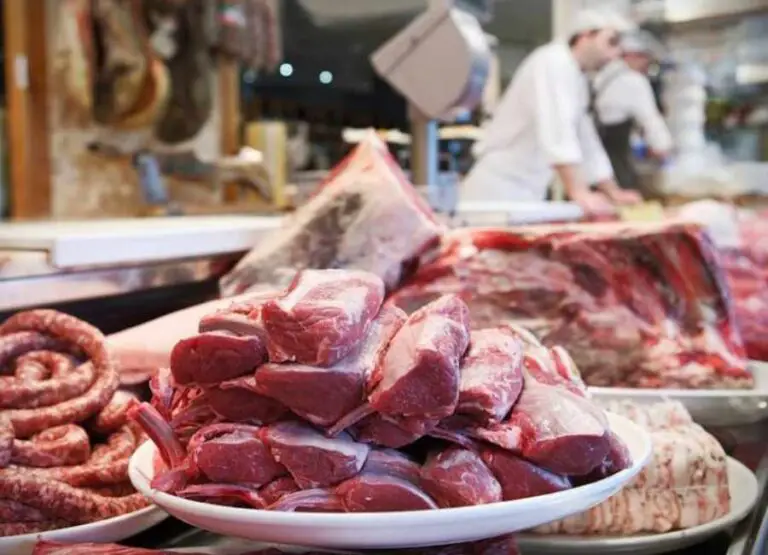
![Do You Flip Meat When Smoking [Answered]](https://foodcreeks.com/wp-content/uploads/2023/02/Do-You-Flip-Meat-When-Smoking-768x555.jpg)
![Can You Rehydrate Beef Jerky [5 Hints]](https://foodcreeks.com/wp-content/uploads/2023/05/Can-You-Rehydrate-Beef-Jerky-768x555.jpg)
![Can Freezer Burned Meat Be Eaten [Answered]](https://foodcreeks.com/wp-content/uploads/2023/02/Can-Freezer-Burned-Meat-Be-Eaten-768x555.jpg)
![How Long Can Smoked Meat Sit Out [Explained]](https://foodcreeks.com/wp-content/uploads/2023/03/How-Long-Can-Smoked-Meat-Sit-Out-768x555.jpg)
